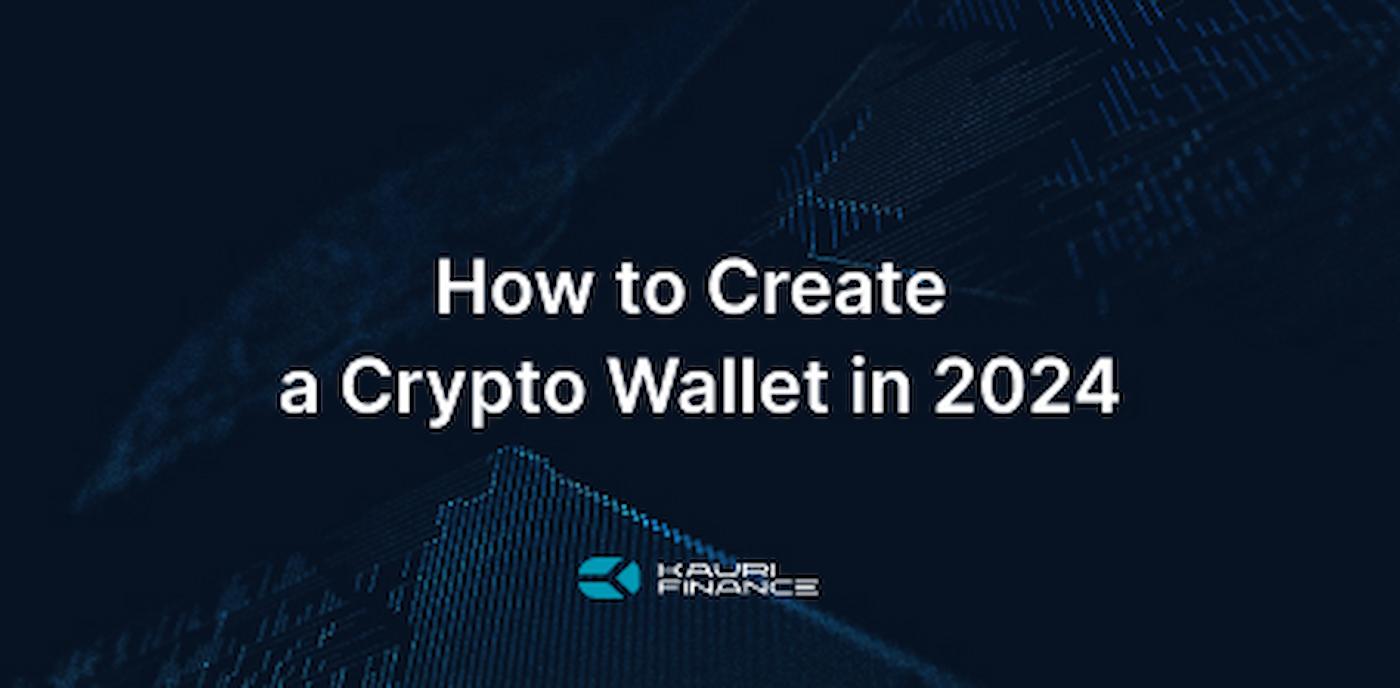
How to Create a Crypto Wallet in 2024?
- What is a crypto wallet?
- Factors to consider when creating a crypto wallet
- What You Need to Open a Crypto Wallet Account
- Types of hot crypto wallets
- How to set up a crypto wallet
- FAQ
- Can I create my own cryptocurrency wallet?
- How do you set up a crypto wallet?
- How much does it cost to build a crypto wallet?
- What Are the Risks Associated With Storing Cryptocurrency?

Can your money stay safe from financial crises and inflation? Many are turning to cryptocurrency for answers. Coins like Bitcoin and Ether operate independently from governments, banks, and big companies. This means they offer an alternative way to store your wealth compared to traditional financial systems. But if we want to keep our savings secure for the long haul, we need a reliable middleman. Since there are no banks in the crypto world, people often rely on services like crypto wallets.
Ever wondered how to create a crypto wallet that attracts users? This article dives into the process of making a cryptocurrency wallet app and gives you the lowdown on how much it'll cost to get your product off the ground.
What is a crypto wallet?
There's a common misconception about crypto wallets – many think they're just for storing cryptocurrencies. But the truth is, a crypto wallet is like a digital safe for your private keys. It's what gives you access to your crypto stash and lets you send and receive different types of digital currencies, whether it's Ethereum, Bitcoin, Binance, or any other crypto flavor.
With a crypto wallet, you can easily keep tabs on how much crypto you've got. And here's the deal: every wallet comes with two keys – private and public. Your private key is like the secret code that proves you own your cryptocurrencies, while the public key smooths the way for hassle-free crypto transactions. Plus, if you're into trading crypto assets on decentralized apps, having a crypto wallet powered by robust blockchain tech makes it a breeze.
Factors to consider when creating a crypto wallet
First, let’s clarify factors to consider when creating a crypto wallet! Creating a crypto wallet can seem overwhelming at first, but considering a few key factors can simplify the process:
- Security: Prioritize security to safeguard your funds against potential threats. Opt for a wallet with robust security features like two-factor authentication, multi-signature support, and reliable backup and recovery options. Choose a wallet with a strong reputation and a proven track record of security.
- Fees: Compare the fees charged by different crypto wallets and choose one with reasonable and transparent pricing. Be aware of any additional fees for specific features or transactions that may apply. Understanding the fee structure can help you manage costs effectively.
- Supported Cryptocurrencies: Assess the range of cryptocurrencies supported by the wallet and ensure it aligns with your investment strategy. Look for a wallet that supports the specific currencies you intend to hold. Check the wallet's website for a list of supported currencies to make an informed decision.
- Customer Service: Evaluate the level of customer support provided by the wallet provider. Choose a wallet that offers responsive customer service and comprehensive resources such as user guides and FAQs. Access to reliable support can be invaluable in addressing any queries or issues that arise during wallet usage.
By considering these factors, you can select a crypto wallet that meets your needs and provides a secure and convenient storage solution for your digital assets.
What You Need to Open a Crypto Wallet Account
Before diving into the world of cryptocurrency, you'll need to set up a crypto wallet to securely store your public and private keys, which prove your ownership of coins. While this might seem daunting for newcomers, the process is relatively straightforward and can be completed in just a few minutes.
Here's a simple overview of the steps involved:
- Choose the type of wallet that suits your needs best.
- Sign up for an account, purchase a hardware device, or download the necessary software.
- Configure your security settings, including setting up a recovery phrase for added protection.
- Acquire cryptocurrency by purchasing it directly or transferring coins from another wallet or exchange.
Types of hot crypto wallets
There are several types of hot crypto wallets:
- Desktop Wallets: These are software applications installed on a user's computer, securely storing private keys on the computer's hard drive through encryption.
- Web Wallets: Offered by crypto exchanges, these wallets allow users to access their funds via a web interface, accessible through web browsers or mobile apps.
- Mobile Wallets: These wallets are designed for smartphones, enabling users to conveniently send, receive, or spend crypto wherever they have their mobile device and internet connection. They come in self-custody and custodial options and are widely available.
How to set up a crypto wallet
Now it’s time to create a Crypto Wallet! Non-custodial software or "hot" wallets put you in full control of your data. These wallets are often free and may offer additional services like staking and lending.
Here's how to set up a software wallet:
- Choose a wallet app and download it on your desktop or mobile device. Many software wallets are available for both options.
- Create an account. This process is relatively straightforward as you won't need to provide personal information. Instead, set up a security measure such as a password or facial recognition.
- Note down your recovery or "seed" phrase. When you create your account, the app will generate a random 12- or 24-word phrase corresponding to your private key. It's crucial to store this phrase securely as you'll need it to access your funds if you lose your login details or want to use them on another device.
- Add cryptocurrency to your wallet. You can do this by transferring tokens from another wallet or linking your account to an exchange within the app settings, which may require additional verification.
Now that your wallet is all set up, it's time for the exciting part: loading it up with your favorite cryptocurrencies. There are a few options available for acquiring crypto:
- Buy crypto at great rates with KAURI: It offers an easy way for self-custody wallet users to purchase crypto at competitive rates and with quick delivery. By leveraging partner relationships, KAURI ensures users get the best possible rates without the hassle of searching across multiple apps and exchanges. Look for the "Best Offer" flag in the KAURI Wallet app or online to stop overpaying for crypto and enjoy seamless transactions.
- Buy from a centralized exchange: For users with custodial wallets, purchasing crypto directly from the centralized exchange managing your wallet is an option. However, convenience comes at a cost, as you'll likely incur various fees that can add up quickly.
- Buy on a decentralized exchange: Some users prefer peer-to-peer transactions via decentralized exchanges, where they can set their own rates. However, the process may be slower since you're reliant on finding someone willing to make the exact exchange you're looking for.
FAQ
Can I create my own cryptocurrency wallet?
To develop your own cryptocurrency wallet app successfully, follow these steps:
- Understand Blockchain and Cryptos.
Blockchain technology is essential for cryptocurrency apps. Learn how blockchain works and its role in securing transactions.
- Use Standard Cryptocurrency Libraries.
Utilize open-source libraries like BitcoinJ SDK or Coinbase SDK. These libraries simplify development and offer essential features.
- Implement APIs:
Integrate APIs like Coinbase or Bitcore for seamless blockchain interaction. APIs enhance app functionality and user experience.
- Choose Cloud Services:
Select a BaaS provider like Amazon, Azure, or Microsoft.Integrate their cloud services into your app for enhanced security.
- Decide on Technology Stack:
- Use Node.js or Angular.js for web apps.
- Opt for Java or Kotlin for native Android apps.
- Consider Swift or Objective-C for iOS apps.
- Prioritize Security.
Implement robust security measures like 2FA, fingerprint, face ID, and hardware authentication. Ensure regular security updates to identify and fix any potential vulnerabilities promptly.
- Analyze Competitors.
Study your competitors to understand their strategies and technologies. Identify unique features they offer and consider incorporating similar or better functionalities into your app for a competitive edge.
- Begin Your App Development.
- Define Features: Outline all the essential features your app will offer. Determine the functionalities required for seamless user experience.
- Develop Application Code: Write and refine the application code, ensuring it aligns with your feature requirements. Integrate the code with your chosen database for data management.
- Design User Interface: Craft a simple and intuitive interface that enhances user interaction. Prioritize user experience by focusing on ease of navigation and visual appeal.
- Conduct Thorough Testing: Perform comprehensive testing to identify and resolve any bugs or issues. Ensure the app functions smoothly across various devices and platforms.
By following these steps, you'll be well-prepared to kickstart your crypto wallet app development journey.
How do you set up a crypto wallet?
There are various types of crypto wallets available, but the three most common ones are hosted wallets, non-custodial wallets, and hardware wallets. The choice between them depends on your specific needs and preferences, especially regarding security.
If you opt for a hosted wallet, here's what you need to do:
- Select a reputable platform: Look for a platform that prioritizes security, user-friendliness, and compliance with relevant regulations.
- Create an account: Provide your personal details and choose a strong password. Using two-step verification (2FA) adds an extra layer of security, so it's recommended.
- Purchase or transfer crypto: Many crypto platforms and exchanges offer the option to buy crypto using a bank account or credit card. If you already own cryptocurrencies, you can transfer them to your new hosted wallet for safe storage.
How much does it cost to build a crypto wallet?
Interested in diving into the realm of cryptocurrency with your Crypto Wallet App? Well, here's the scoop: Features are the name of the game. The cost largely depends on the features you desire. A simple wallet might set you back anywhere from $20,000 to $50,000. But if you're after more advanced functionalities like multi-currency support or QR code scanning, be prepared to shell out upwards of $50,000 to $150,000 or even more.
What Are the Risks Associated With Storing Cryptocurrency?
Using a cryptocurrency wallet comes with its fair share of security concerns. For starters, there's the ever-looming threat of hackers swooping in through software loopholes or app vulnerabilities. This is especially true for "hot" wallets, which are connected to the internet via mobile devices or computers. Some wallet apps even let you export private keys, which, if mishandled, can open the floodgates to theft. Then there's the nightmare scenario of forgetting your login details or losing your phone, which could lock you out of your wallet indefinitely. Web-based wallets, like those on Coinbase, are also prime targets for hackers if they don't have top-notch security measures in place. And let's not forget about desktop wallets, which are only as secure as your computer's defenses. If your data isn't encrypted or properly safeguarded, it's like leaving the front door wide open for cyber crooks.
